
Revista Internacional de Educacion para la Justicia Social
Scope & Guideline
Pioneering Research for a Fairer World
Introduction
Aims and Scopes
- Social Justice in Education:
The journal focuses on the role of education in addressing social injustices, including racial, gender, and economic disparities. It explores how educational practices can be transformed to promote equity and social change. - Intercultural and Indigenous Education:
There is a significant emphasis on intercultural education, particularly regarding indigenous communities. The journal publishes research on pedagogical approaches that respect and integrate indigenous knowledge and practices. - Environmental Justice Education:
The journal highlights the intersection of education and environmental issues, advocating for eco-justice and sustainability in educational curricula and practices. - Critical Pedagogy and Activism:
Research that engages with critical pedagogy and the role of educators as activists is a consistent theme. The journal promotes studies that examine how teaching practices can challenge dominant narratives and foster democratic engagement. - Teacher Education and Professional Development:
The journal addresses the training and professional development of educators, focusing on how teacher education programs can better prepare teachers to address issues of social justice and inclusion in their classrooms.
Trending and Emerging
- Racial and Ethnic Justice in Education:
An increasing number of studies are focusing on racial and ethnic justice within educational contexts. This trend reflects a growing recognition of the need to address systemic racism and promote inclusivity in educational settings. - Ecofeminism and Environmental Education:
There is a notable rise in research that merges ecofeminism with educational practices. This emerging theme explores the role of art and creativity in promoting ecological awareness and social justice. - Gender and Sexual Diversity in Education:
The journal is increasingly addressing issues related to gender and sexual diversity, with a focus on how educational practices can support LGBTQ+ inclusion and challenge heteronormativity. - Community-Based and Participatory Research:
There is a growing trend towards community-based and participatory research methodologies, emphasizing collaboration between educators, students, and local communities to address social justice issues. - Digital Equity and Education:
The impact of digital technology on education, particularly regarding equity and access, is an emerging theme. The journal is exploring how digital tools can be leveraged to foster inclusive educational practices.
Declining or Waning
- Traditional Curriculum Models:
There seems to be a declining focus on traditional curriculum models that do not emphasize social justice or critical pedagogy. Research that promotes conventional education frameworks is becoming less relevant in the journal's discourse. - Standardized Testing and Assessment:
The emphasis on standardized testing and assessment practices appears to be diminishing. There is a shift away from discussing assessment in isolation, as the journal increasingly favors holistic and participatory assessment approaches. - General Education Policies Without a Justice Lens:
Research that examines general education policies without a specific focus on their implications for social justice is becoming less common. The journal is moving towards more critical analyses that interrogate the social impacts of educational policies. - Individualistic Approaches to Learning:
There is a noticeable decline in research that promotes individualistic approaches to learning, such as competition-based frameworks. The journal is increasingly favoring collaborative and community-based educational practices. - Non-critical Approaches to Teacher Training:
Previous discussions surrounding non-critical or traditional teacher training methods are waning. The journal now emphasizes the need for teacher education that incorporates critical reflection and social justice principles.
Similar Journals
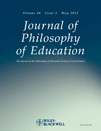
JOURNAL OF PHILOSOPHY OF EDUCATION
Connecting Historical Contexts with Modern Educational Practices.JOURNAL OF PHILOSOPHY OF EDUCATION, published by Oxford University Press, serves as a premier platform for interdisciplinary research at the intersection of education, history, and philosophy. Established in 1967, this journal has consistently contributed to the academic discourse by publishing insightful articles that challenge conventional thinking and inspire innovative pedagogical practices. With a distinguished ranking in the top quartiles of History and Philosophy and a respectable Q3 position in Education, it occupies a significant niche in the scholarly community. The journal's high Scopus rankings signify its impact, being placed in the 94th percentile for History and the 86th percentile for Philosophy. It welcomes contributions that explore theoretical frameworks, historical contexts, and practical implications of philosophical inquiries into education. Although it does not currently offer Open Access options, the journal remains a vital resource for academics and practitioners seeking to deepen their understanding of educational philosophy. With contributions expected to continue until 2024, the JOURNAL OF PHILOSOPHY OF EDUCATION is poised to remain a crucial avenue for advancing educational thought and research.
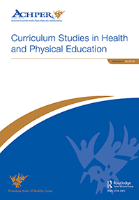
Curriculum Studies in Health and Physical Education
Unlocking Potential through Comprehensive Curriculum Studies.Curriculum Studies in Health and Physical Education, published by Taylor & Francis Ltd, is a leading academic journal that focuses on the intersection of health, physical education, and curriculum development. Since its inception in 2018, this journal has dedicated itself to advancing knowledge and practices within the fields of education, orthopedics, and sports medicine, achieving impressive quartile rankings in 2023 (Q2) across these disciplines. With its ISSN 2574-2981 and E-ISSN 2574-299X, it has established a robust academic footprint, ranking #533 in Social Sciences - Education and #93 in Health Professions - Physical Therapy as per Scopus metrics. This journal offers an essential platform for researchers, educators, and practitioners to disseminate cutting-edge research while fostering collaborative dialogue in the pursuit of enhanced health and physical education curricula. The journal's commitment to open access ensures that significant contributions to the field remain accessible to a global audience, promoting widespread knowledge-sharing and innovative solutions in health and physical education.
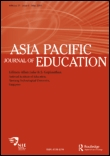
Asia Pacific Journal of Education
Navigating contemporary educational challenges with scholarly rigor.Asia Pacific Journal of Education is a leading scholarly journal dedicated to advancing research and discourse in the field of education within the Asia Pacific region. Published by Routledge Journals, Taylor & Francis Ltd, this journal plays a pivotal role in shaping educational theories and practices, offering significant insights from diverse cultural and pedagogical perspectives. With an impressive impact factor and a 2023 Scopus ranking placing it in the 76th percentile in the education sector, the journal is recognized for its contribution to academic excellence, reflecting high-quality research and innovation. Researchers, educators, and policymakers are encouraged to submit their work, as the journal not only publishes peer-reviewed articles but also fosters critical discussions on contemporary educational challenges and trends from 2008 to 2024. Access options are available through subscription, ensuring the critical research reaches a broad audience, making this journal an essential resource for anyone involved in the field of education.
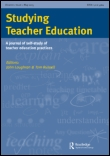
Studying Teacher Education
Pioneering Research for Tomorrow's EducatorsStudying Teacher Education is a prominent academic journal dedicated to advancing research in the field of education, particularly focused on the evolving dynamics of teacher training and professional development. Published by Routledge Journals, Taylor & Francis Ltd, this peer-reviewed journal fosters critical discussions and disseminates significant findings from studies that influence educational practices globally. With an impressive Q2 ranking in the Education category and a Scopus rank of #682 out of 1543, it occupies a vital space for researchers and practitioners dedicated to enhancing educator effectiveness and student outcomes. The journal publishes original research, reviews, and theoretical perspectives and is committed to quality and relevance, making its contributions invaluable for shaping future educational policies and practices from 2010 to 2024. While currently not open access, articles within this journal can typically be accessed through institutional subscriptions, promoting wide dissemination among academics. Through rigorous scholarship, Studying Teacher Education aims to bridge the gap between theory and practice, serving as an essential resource for educators, researchers, and policymakers alike.

In Education
Connecting research and practice in the world of education.In Education is a prestigious open-access journal published by the Faculty of Education at the University of Regina, dedicated to advancing research in the field of education. With its ISSN 1927-6117, the journal has been a vital platform for scholarly work since 2009, providing a significant avenue for educators, researchers, and practitioners to share innovative ideas and research findings. Committed to fostering a rich dialogue on educational practices and policies, In Education publishes a diverse range of articles that cover theoretical and empirical research, ensuring a comprehensive exploration of contemporary educational issues. By encouraging open access, the journal promotes widespread dissemination of knowledge, facilitating greater accessibility for students and professionals alike. As a contributor to the evolving landscape of educational research, In Education serves as an essential resource for those aiming to transform educational practices through informed, evidence-based insights.

Multicultural Education Review
Exploring the Tapestry of Multicultural EducationWelcome to the Multicultural Education Review, an esteemed academic journal published by ROUTLEDGE JOURNALS, TAYLOR & FRANCIS LTD. As a prominent resource in the fields of Anthropology and Education, this journal aims to foster the understanding of multicultural perspectives in educational practices. With a robust impact factor and recognition in the Q1 and Q2 quartiles across its categories, the journal offers a vital platform for researchers, educators, and students to share innovative studies and discussions related to multicultural education. Though operating under a subscription model, the journal's content is pivotal for advancing scholarship and dialogue in diverse educational contexts. Since its inception in 2009, the journal continues to shape the discourse on inclusivity, equity, and cultural diversity, ensuring eligibility for a broad readership keen on addressing contemporary educational challenges.
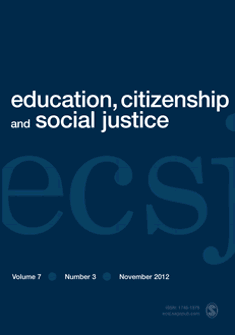
Education Citizenship and Social Justice
Advancing equity through education and citizenship.Education Citizenship and Social Justice is a prominent academic journal published by SAGE Publications Inc, dedicated to advancing the discourse around education's role in citizenship and social justice issues. Since its inception in 2006, the journal has provided a critical platform for researchers, educators, and policymakers to explore the intersections of education, citizenship, and equity within diverse societal contexts. With an impressive ranking of #685 out of 1543 in the Social Sciences - Education category and a 2023 Quartile 2 status, it is firmly established as a significant resource in its field. Although the journal does not currently operate with an open access model, its impact on the education sector remains profound, offering valuable insights that contribute to the development of inclusive educational practices. Researchers and students alike will find the journal's rigor and commitment to social justice principles vital as they navigate the evolving landscape of educational research and policy.

International Journal of Multicultural Education
Exploring diverse educational landscapes with purpose.The International Journal of Multicultural Education (IJME), published by EASTERN COLL, DEPT EDUCATION, is a leading open-access journal dedicated to advancing the field of multicultural education. Established in 2007, this journal has become an essential platform for researchers, educators, and policymakers interested in exploring the complexities of education in diverse cultural contexts. With an impressive impact factor and strong rankings in multiple categories including Q1 in Anthropology and Cultural Studies, and Q2 in both Education and Social Sciences, the IJME provides high-quality, peer-reviewed articles that contribute to impactful educational practices and scholarship. The journal's open access model ensures that its invaluable research reaches a global audience, fostering dialogue and collaboration among academics, practitioners, and students. By focusing on themes that address social justice, equity, and cultural awareness in education, the IJME plays a critical role in shaping inclusive and effective educational frameworks for the future.
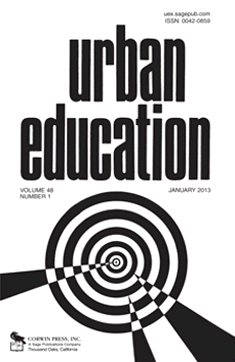
URBAN EDUCATION
Shaping Policies for a Brighter Urban Future.URBAN EDUCATION, published by SAGE Publications Inc, stands at the forefront of the fields of education and urban studies. With a history dating back to 1965 and a converged publication reach extending to 2024, this journal plays a pivotal role in disseminating research that addresses the complexities of urban educational environments. Holding prestigious Q1 rankings in both education and urban studies categories, and boasting an impressive Scopus ranking, URBAN EDUCATION is recognized for its high impact on scholarly discourse and policy development. The journal aims to provide a platform for cutting-edge research that informs practice, enhances educational policy, and contributes to the improvement of educational outcomes in urban contexts. While it currently does not offer open access options, the rich content and critical insights produced within its pages remain invaluable to researchers, professionals, and students committed to addressing the myriad challenges in urban education.

Asia-Pacific Journal of Teacher Education
Fostering Innovation in Teacher Education for Tomorrow's Leaders.Asia-Pacific Journal of Teacher Education is a prestigious quarterly publication dedicated to advancing the field of education, particularly focusing on teacher education within the Asia-Pacific region. Published by Routledge Journals, Taylor & Francis Ltd, this journal holds a distinguished position as a Q1 journal in Education, reflecting its commitment to excellence with a Scopus rank of #328 out of 1543 in the Social Sciences Education category, placing it in the 78th percentile. The journal not only aims to disseminate high-quality research but also to foster dialogue among educators, policymakers, and researchers to improve teaching practices and learning outcomes. While it operates under a traditional access model, the journal provides valuable insights into the most pressing educational challenges and innovations, making it essential reading for those invested in teacher education and professional development. With a history of impactful contributions since its inception in 2006, the Asia-Pacific Journal of Teacher Education continues to stay relevant through 2024 and beyond, offering a vital platform for emerging scholarship and collaboration in the educational landscape.